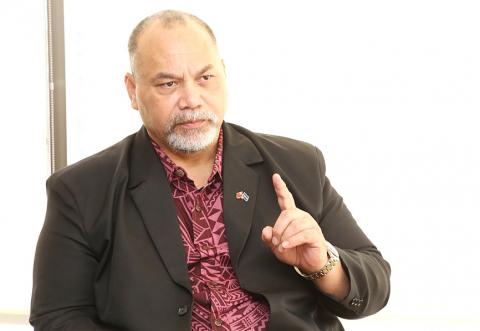Nauruan President Lionel Aingimea, who is in Taiwan for his first foreign visit since assuming office in August, yesterday reaffirmed Nauru-Taiwan relations amid ongoing Chinese expansion in the South Pacific.
Aingimea on Friday arrived in Taiwan for a five-day state visit, his third to Taiwan and first as president.
The bilateral relations are significant, Aingimea said, adding that he sees Taiwan as family.

Photo: CNA
“When you start using words like family, it takes it up to a different level, a level that ensures that when things happen within family, family sticks together,” Aingimea said in an interview with the Central News Agency.
He said that Nauru-Taiwan relations are not limited to development, but also include a personal element, citing as an example Nauruans who study in Taiwan and take Taiwanese culture and customs with them when they return home.
He also enumerated Taiwan’s assistance to Nauru in education, police matters, agriculture, fisheries and renewable energy, as well as Taiwan’s contribution to the Intergenerational Trust Fund established in 2015 by several regional partners.
China has not attempted to pressure Nauru to switch diplomatic relations, probably because Beijing knows Nauru’s political stance and realizes that it would be a wasted effort to approach Nauru on that issue, Aingimea said.
“We are concerned about China’s increased presence in the Pacific. We reject the ‘one China’ principle and the ‘one country, two systems’ framework, and recognize that Taiwan is a sovereign and independent nation,” he said.
Aingimea welcomed a proposal by Tuvaluan Minister for Justice, Communication and Foreign Affairs Simon Kofe, who visited Taiwan last month, to form a coalition that supports Taiwan against China’s suppression.
Australia and New Zealand have taken steps to counter China’s expansionist strategy in the South Pacific, with initiatives such as “Pacific Step-up” and “Pacific Reset,” while the US is to hold a meeting with its allies next year for relevant discussions, Aingimea said.
To counter China’s dollar diplomacy, the three traditional partners also increased assistance to Nauru, Aingimea said, adding that there are no Beijing-funded infrastructure projects in Nauru.
However, a new port is being constructed in the country by a Chinese company, he said, adding it is an Asian Development Bank project and the Chinese company won the bid.
Nauru would need Taiwan’s expertise to operate the port when it is completed, so its economy can diversify from its heavy reliance on fishing and phosphate mining, Aingimea said.

The High Prosecutors’ Office yesterday withdrew an appeal against the acquittal of a former bank manager 22 years after his death, marking Taiwan’s first instance of prosecutors rendering posthumous justice to a wrongfully convicted defendant. Chu Ching-en (諸慶恩) — formerly a manager at the Taipei branch of BNP Paribas — was in 1999 accused by Weng Mao-chung (翁茂鍾), then-president of Chia Her Industrial Co, of forging a request for a fixed deposit of US$10 million by I-Hwa Industrial Co, a subsidiary of Chia Her, which was used as collateral. Chu was ruled not guilty in the first trial, but was found guilty

DEADLOCK: As the commission is unable to forum a quorum to review license renewal applications, the channel operators are not at fault and can air past their license date The National Communications Commission (NCC) yesterday said that the Public Television Service (PTS) and 36 other television and radio broadcasters could continue airing, despite the commission’s inability to meet a quorum to review their license renewal applications. The licenses of PTS and the other channels are set to expire between this month and June. The National Communications Commission Organization Act (國家通訊傳播委員會組織法) stipulates that the commission must meet the mandated quorum of four to hold a valid meeting. The seven-member commission currently has only three commissioners. “We have informed the channel operators of the progress we have made in reviewing their license renewal applications, and

‘DENIAL DEFENSE’: The US would increase its military presence with uncrewed ships, and submarines, while boosting defense in the Indo-Pacific, a Pete Hegseth memo said The US is reorienting its military strategy to focus primarily on deterring a potential Chinese invasion of Taiwan, a memo signed by US Secretary of Defense Pete Hegseth showed. The memo also called on Taiwan to increase its defense spending. The document, known as the “Interim National Defense Strategic Guidance,” was distributed this month and detailed the national defense plans of US President Donald Trump’s administration, an article in the Washington Post said on Saturday. It outlines how the US can prepare for a potential war with China and defend itself from threats in the “near abroad,” including Greenland and the Panama

Taiwan People’s Party (TPP) Chairman Huang Kuo-chang (黃國昌) yesterday appealed to the authorities to release former Taipei mayor Ko Wen-je (柯文哲) from pretrial detention amid conflicting reports about his health. The TPP at a news conference on Thursday said that Ko should be released to a hospital for treatment, adding that he has blood in his urine and had spells of pain and nausea followed by vomiting over the past three months. Hsieh Yen-yau (謝炎堯), a retired professor of internal medicine and Ko’s former teacher, said that Ko’s symptoms aligned with gallstones, kidney inflammation and potentially dangerous heart conditions. Ko, charged with